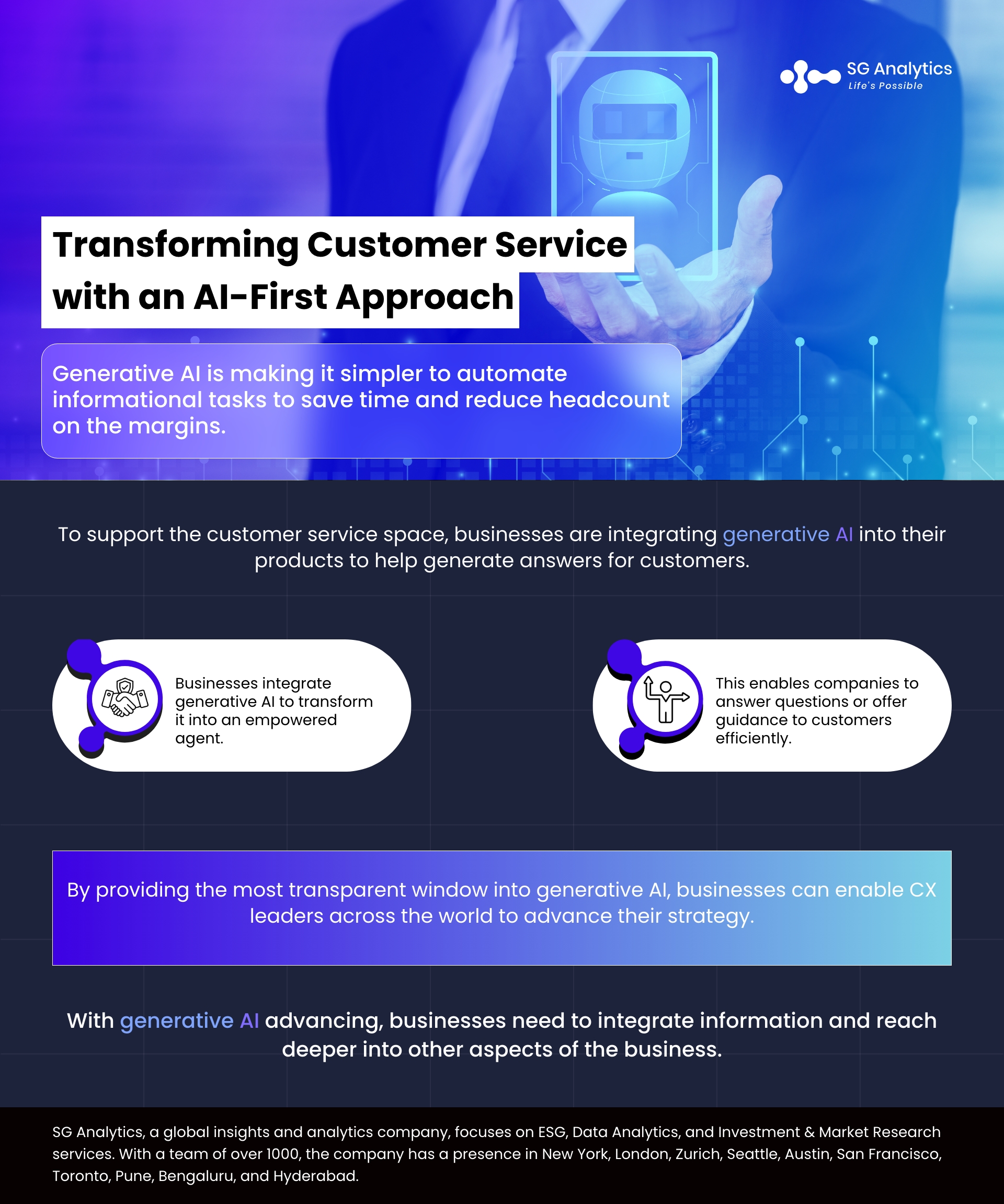The world's leading AI-native customer service automation platforms are enabling leaders to innovate in the CX space. Discussions about types of work and classes of employees that are likely to be disrupted out of existence. However, concerns have been circulating about categories of enterprise software.
The full-scale deployments of Gen AI in customer service settings are leading to a certain level of human oversight. AI-enabled support will help in enabling user journeys virtually. Generative AI also supports service bots customized to the specific needs of customers, thereby acting as their personal assistant to fully understand customers' relationship with the company and anticipate their needs and concerns. This will help in designing a full picture of the customer life cycle.
Connecting Intelligence to Action
With ChatGPT-style implementation, generative AI is presenting businesses with a level of utility and agency. It enables them to find answers to questions. The toll can also tell customers where to look up their order status. There is no reason generative AI has to stop passively offering answers. If the systems are trained properly, the policies and workflows will further help in defining the processes generated by agents. When a customer asks for their order status, the system can search for them. If the order number is not present in the system, they can ask for further information to identify the customer. The system can also be trained to reach out to the shipper, elevate the inquiry to a higher position, or generate a refund.
Read more: Establishing Transparency and Trust to Safeguard Sensitive Customer Data
By connecting each hypothetical next step with the API system, businesses can integrate generative AI to transform it into an empowered agent. However, the system should be realistic for an autonomous agent to reach the level of competence of a smart employee. It will also help the customers to get across the finish line. Businesses will also need guardrails to ensure the system is not returning the wrong customer's account from the backend system.

Exploring Beyond Automation
In today's digital space, a fundamental shift has begun in the way businesses think about and integrate generative AI. The eruption of GPT-4 earlier this year has the onset of a new wave of startups promising to harness its power. While these have been along the lines of generative AI bolt-ons, businesses have been using large language models (LLMs) to automate language-based tasks. There is utility in use cases like these. However, it is still a narrow way to think about something as powerful as generative AI.
To support the customer service space, businesses are integrating generative AI into their products to help generate answers for customers. This is different from traditional chatbot automation, as it enables companies to answer questions or offer guidance to customers efficiently.
Generative AI is making it simpler to automate informational tasks to save time and reduce headcount on the margins. Better automation is offering a new goal focused on growing autonomy as businesses are building AI systems that can go beyond conversing with customers.
Read more: AI at Crossroads: Navigating AI Safety in the Evolving Startup Landscape
Businesses are putting LLMs to work in their customer care centers and taking advantage of added generative AI capabilities to help teams draft rich and thorough responses more quickly. The chatbots are trained on data that can contain intrinsic biases and generate inaccuracies - a real problem in corporate contexts. This occasional error can result in significant costs to a company's bottom line.
The large language models upon which ChatGPT and other generative AI applications are built help power the systems, enabling them to respond to prompts with human-like text and answer complex questions with seeming ease. Businesses have begun testing generative AI's capabilities as the technology is rapidly gaining acceptance due to the variety and nature of the responses it offers.

Businesses are now beginning to witness the next great shift by moving their operations from cloud systems to a new cloud-based ecosystem built around AI as the fundamental technology unit. Systems frameworks are expected to be replaced with a new stack consisting of databases for logging, adding a layer of intelligence and offering customer-centric solutions to handle critical tasks and solve problems autonomously.
This further makes customer service operations natural. Once implemented at scale, the technology could help increase productivity across different tasks and enhance customer service interactions.
With the fanfare about generative AI, it is safe to say that people are thinking about its potential impact.
The Future of AI‑first Customer Service
The juggernauts of enterprise systems are working with Generative AI to build intelligence into their products and their marketing messages. But even then, their ability to adapt can be constrained by outdated thinking about business frameworks. Companies across industries are exploring ways to augment the capabilities of generative AI in their customer care centers.
Companies are exploring ways to incorporate this powerful new technology into their customer care functions and determine use cases that will further help in delivering the most value.
Companies must proceed through all these stages and are imagining ways to integrate into a fully AI-enabled customer care center. Integrating the most suitable approach involves building a customer-facing platform based on a combination of traditional AI, including machine-learning systems, LLMs, and prompt engineering. The elements involve developing and optimizing the data and constraints to enhance the accuracy of solutions by defining company-specific keywords within the prompt. This process further allows companies to achieve adequate levels of control and personalization.
By providing the most transparent window into the form of generative AI in customer services, businesses can enable CX leaders across the world to advance their AI strategy.

Read more: Integrating Customer Advocacy into Marketing Strategy
Final Thought
In highly regulated industries, heightened data security requirements are a growing imperative for businesses with more complex and personalized use cases. At the same time, fine-tuning existing models has also become a more popular option in order to ensure faster response times to solve complex customer requests.
These recent rapid advances in generative AI are transforming the ways organizations manage their critical customer service functions. However, they need to anticipate how the technology's considerable capabilities could become more profound.
Considering today's large customer service functions will become nimble, data-driven organizations will work closely with the rest of the business to create differentiating customer experiences as generative AI systems are learning more about a company's products and operations, enabling businesses to predict customer behavior and present solution to customers' needs.
With generative AI advancing, businesses need to integrate information and reach deeper into other aspects of the business.
SG Analytics, recognized by the Financial Times as one of APAC's fastest-growing firms, is a prominent insights and analytics company specializing in data-centric market research and contextual analytics. Operating globally across the US, UK, Poland, Switzerland, and India, we expertly guide data from inception to transform it into invaluable insights using our knowledge-driven ecosystem, results-focused solutions, and advanced technology platform. Our distinguished clientele, including Fortune 500 giants, attests to our mastery of harnessing data with purpose, merging content and context to overcome business challenges. With our Brand Promise of "Life's Possible," we consistently deliver enduring value, ensuring the utmost client delight.
A leading enterprise in Customer Analytics, SG Analytics focuses on leveraging cutting-edge technologies and methods to provide cutting-edge customer analytics solutions and retain your customers by preventing churn-inducing customer behaviors. Contact us today to make critical data-driven decisions and develop more effective customer engagement initiatives, leading to happier customers.
About SG Analytics
SG Analytics is an industry-leading global insights and analytics firm providing data-centric research and contextual analytics services to its clients, including Fortune 500 companies, across BFSI, Technology, Media and entertainment, and Healthcare sectors. Established in 2007, SG Analytics is a Great Place to Work® (GPTW) certified company and has a team of over 1100 employees and has presence across the U.S.A, the U.K., Switzerland, Canada, and India.
Apart from being recognized by reputed firms such as Analytics India Magazine, Everest Group, and ISG, SG Analytics has been recently awarded as the top ESG consultancy of the year 2022 and Idea Awards 2023 by Entrepreneur India in the “Best Use of Data” category.









